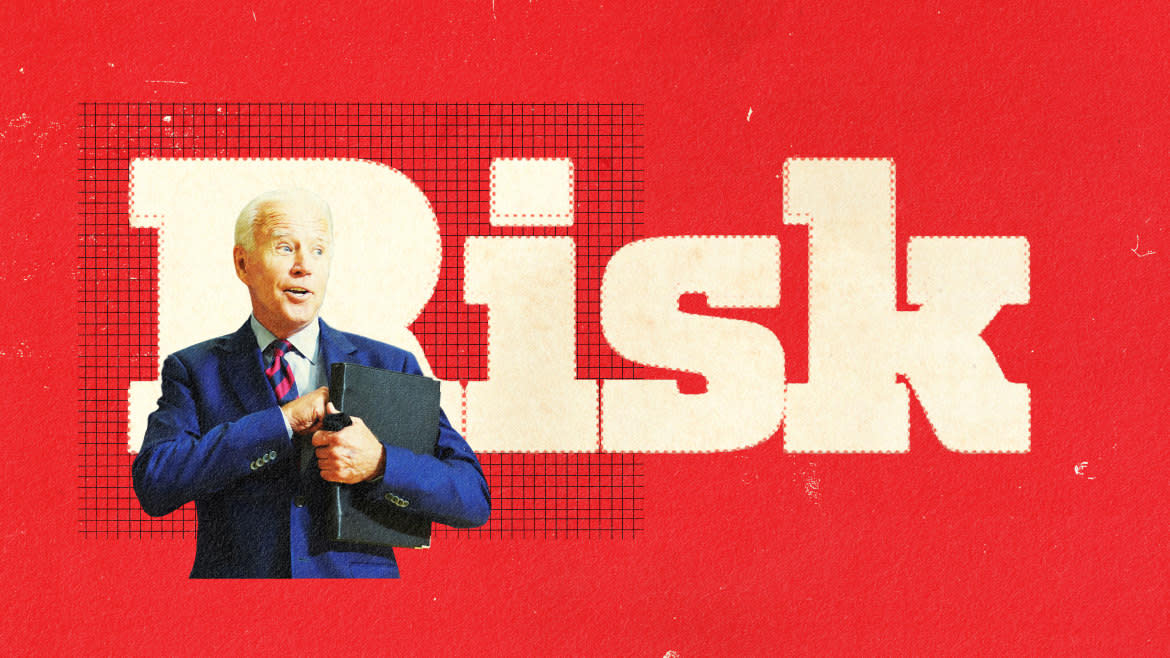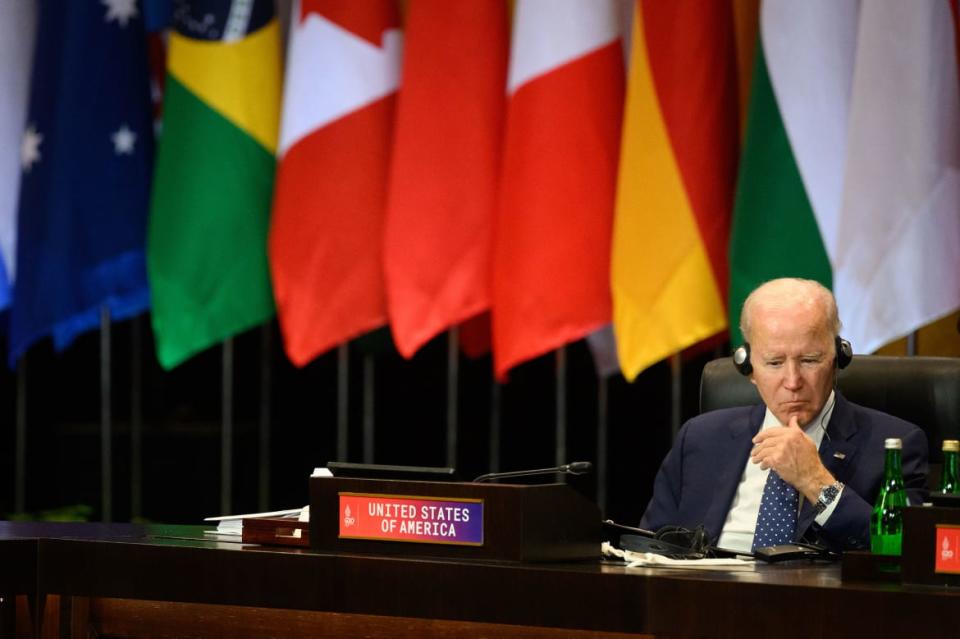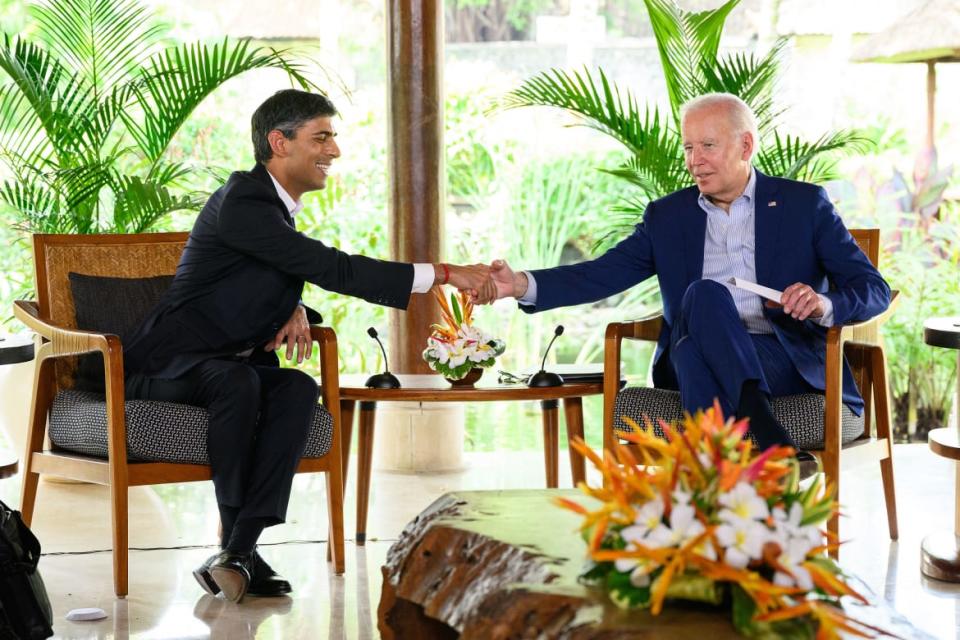Biden Needs to Take Greater Foreign Policy Risks to Avoid a World War

President Joe Biden has been hesitant to provide new weapons to Ukraine, most notably Army Tactical Missile Systems (ATACMS) and F-16 jets, just as he was hesitant to provide Ukraine with Patriot batteries, High Mobility Artillery Rocket Systems (HIMARS), and tanks.
In the Middle East, as the Islamic Republic of Iran is increasing its enriched uranium stockpile in grade and mass, while escalating its proxy attacks against U.S. forces, the administration remains paralyzed to respond with anything other than bribing the regime with $24 billion cash—to which it is gradually giving Iran access.
Also with China, relations are challenging. The last time there was such a standoff was in 2001, over a U.S. spy aircraft caught by the Chinese, prompting an apology from the U.S. government. The table has since turned. After a public outcry over a Chinese flying object with advanced technology collecting intelligence (or “the silly balloon” as the president described it) in U.S. airspace, the president shot down the spyware, and the Chinese severed relations in response.
Blinken, Xi Take a Step Back From U.S.-China Cold War
Not talking with a strong adversary risks misunderstandings, and the administration appears to be at extreme unease over it. To restore the relationship, the administration has been all-but-apologizing to the Chinese since.
CIA Director Bill Burns, possibly under the confusion that he is still a professional diplomat rather than a spy chief, secretly traveled to China to convince the adversary to resume normal relations. It came shortly after Jake Sullivan, the president’s assistant for national security affairs, made the same attempt in Vienna during a talk with the Chinese minister of foreign affairs.

Joe Biden attends a working session on food and energy security during the G20 Summit on November 15, 2022 in Indonesia.
Secretary of Defense Lloyd Austin, too, has been begging for a call with his Chinese counterpart for months to resume contact between the two militaries, which the Chinese halted after the balloon incident and a key component in keeping the peace during the Cold War, thus far to no avail. Partially, he seeks to implement a presidential initiative. During a G-20 meeting in Bali, Biden stated that he and the Chinese Communist Party secretary general, Xi Jinping, had agreed that they “should have an open hotline” to prevent misunderstandings. Except that the Chinese aren’t picking up the phone.
Finally, on June 18, Secretary of State Antony Blinken visited Beijing and briefly spoke with Xi and other officials. According to the preliminary reports, the two sides agreed to “stabilize” relations, but the Chinese did not agree to resuming military diplomacy as long as the United States keeps its sanctions on Chinese entities. Now, the risk-averse administration has to choose whether to de-risk the relationship, or de-sanction it.
There are two kinds of de-risking. The first one is for the private sector to divest from China, anticipating worsening relations. The sanctions and tariffs of the past several years assured that it was already underway, with businesses anticipating that investment in China is no longer a safe bet. All good. The other is maintaining the status quo of relations—not the sour status quo, but the hot peace with China over the past decade—which appears to have been the objective of Blinken’s trip.
All of these efforts have sought to minimize the risk of a conflict, something also true of the administration’s treatment of Russia and Iran.
It is imperative to manage the risk of an unnecessary conflict with China, or any adversary, especially one that could unravel into a war. But it is worth considering that risk-aversion is itself a risk.
The United States is the world’s hegemon. This is another way of saying that it is the world’s judge, jury, and executioner.
Despite the cries of “too many problems at home” on the right and left alike, it should be needless to say (and it regrettably is not) that, by virtue of setting the rules of the world and enforcing them, Americans are the greatest beneficiary of their own investment.
But these benefits come with the burden of necessitating guts.
COVID Proved We’re Unprepared to Handle China’s Dictatorship
The only thing that stands between World War III, one that will be far more catastrophic than its predecessor, and us is America’s commitment to say no when adversaries break the rules. It was a lack of commitment that caused World War II.
America’s treatment of Russia since Vladimir Putin’s ascent to power has been hardly any different than its treatment of Adolf Hitler. America turned a blind eye to his undermining of the weak Russian democracy, of Russia’s minor and major incursions into his neighbors’ territories, and of the annexation of Crimea.
Rarely do we get an answer to a historical what if?, but we have ours now. What if the United States and the United Kingdom armed Czechoslovakia and told it to stand up to the Nazis? Hitler would have looked as miserable as Putin does today.

British Prime Minister Rishi Sunak shakes hands with President Joe Biden of the United States of America during a bilateral meeting at the G20 summit in Indonesia.
But they did not then for the same reason that the administration is too cautious to escalate its aid to Ukraine, punish Iran, and let the Chinese temper tantrum run its course: risk-aversion. (To be clear, as I stated, it’s a risk-aversion of a lower degree, evident by the different policies toward Czechoslovakia in 1938 and Ukraine today.)
Risk-aversion is its own risk. Refusing to enforce one’s own rules and penalize a strong adversary invites a much greater aggression that can no longer be ignored, but against an adversary now much stronger and an aggression much greater.
The U.S. is a much stronger power than its adversaries, but it is not acting as such. The cowardice, disguised as risk management, is feeding into the narrative that America is too tired and war-wary to defend its own interests.
Iran and Russia Won Syria’s Civil War (and the U.S. Lost It)
It must stop. Evil totalitarians do not respond to pleas and lectures; they only respond to force, and history is no void of great empires which fell because they refused to employ force—or did so too little and too late.
If the administration is worried that the enforcement of international rules and norms is not risk-free, if it is worried about unforeseen consequences, then it should vacate the business of government.
Tom Schelling was a Cold War strategic thinker whose writings helped a first-time superpower understand peacetime great power relations and war, and his most famous quote influenced many Cold War policymakers. It remains true today. Deterring a war depends on “a threat that leaves something to chance,” he said.
As terrifying as it is, sometimes, the options are leaving our collective fate to chance or to our mortal enemies. President Biden needs to take his chances.
Get the Daily Beast's biggest scoops and scandals delivered right to your inbox. Sign up now.
Stay informed and gain unlimited access to the Daily Beast's unmatched reporting. Subscribe now.

